Can Essential Oils Help Manage Lupus?
Maintaining your health is the single most important thing in life for most people. After all, without good health it can be difficult to feel good mentally as well as physically, and poor health can greatly diminish your enjoyment of each day and what it has in store for you.
Some diseases can be much more difficult to manage than others, and lupus is one of the most serious out there. Finding the right treatments for lupus is important, and essential oils could be a part of your daily regimen.
What is Lupus?
Systemic lupus erythematosus (SLE), commonly known as lupus, is a chronic autoimmune disease that can affect various parts of the body. In this condition, the immune system mistakenly attacks healthy tissues and organs, leading to inflammation and damage. Lupus can affect multiple systems, including the skin, and ones mentioned below;
- The heart
- Joints
- Kidneys
- Liver
- Lungs
- Brain
- Stomach
Making matters worse, lupus symptoms are often similar to a number of other conditions like thyroid problems or fibromyalgia. Because of this, lupus is often misdiagnosed for some time before finally discovered to be the culprit causing problems. In fact, it can often take years to finally be diagnosed with this disease and start confronting it.
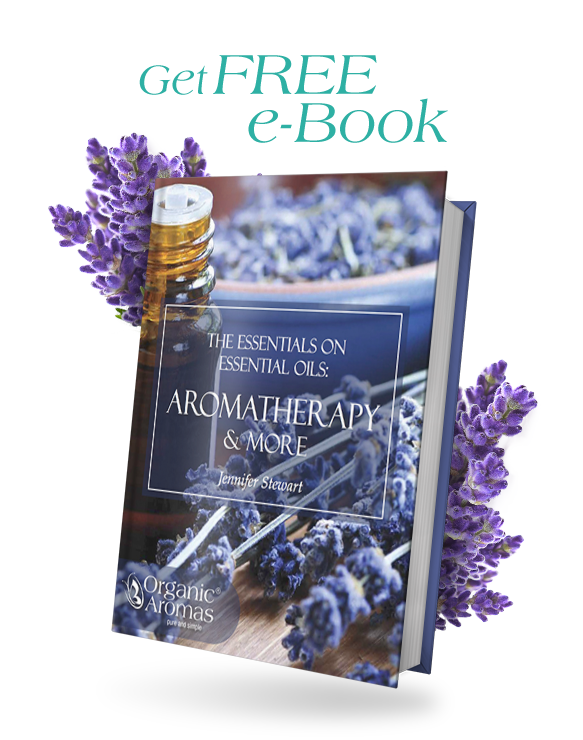
Sign Up to Get Your FREE
e-Book Here…
What are the Symptoms of Lupus?
Symptoms may include:
- Joint pain
- Fatigue
- Muscle aches
- Stiffness and swelling
- Fever
- Headache
- Insomnia
- Depression
- Anemia
- Blurry vision
- Memory loss
- Anxiety
- Rashes
Guide to Prevent Lupus Naturally
Lupus is a autoimmune disease that affects millions of people worldwide. While there is no known cure for lupus, there are various natural remedies and techniques that may help in preventing the onset or progression of the disease. In this comprehensive guide, we will explore these remedies and provide practical tips for managing lupus symptoms.
- Anti-Inflammatory Diet: One of the key factors in preventing lupus flare-ups is reducing inflammation in the body. Adopting an anti-inflammatory diet can play a significant role in managing lupus symptoms and preventing the disease from worsening. Include foods rich in omega-3 fatty acids, such as fatty fish (salmon, mackerel), walnuts, and flaxseeds. Avoid processed foods, sugary snacks, and excessive consumption of red meat.
- Turmeric: Curcumin, the active compound found in turmeric, has powerful anti-inflammatory properties that may help reduce lupus-related inflammation. Incorporating turmeric into your cooking or taking curcumin supplements can potentially alleviate symptoms and prevent flare-ups.
- Vitamin D: Studies have shown that vitamin D deficiency is prevalent among lupus patients. Increasing your intake of vitamin D through sunlight exposure or supplements may help regulate the immune system and reduce the risk of developing lupus.
- Stress Management: Stress has been known to trigger lupus flare-ups. Implementing stress-reduction techniques such as mindfulness meditation, yoga, deep breathing exercises, and regular exercise can help manage stress levels and minimize the likelihood of flare-ups.
- Regular Exercise: Engaging in low-impact exercises like swimming, cycling, or walking can improve cardiovascular health, boost mood, and strengthen muscles and joints. It’s important to consult with your healthcare provider before starting any exercise regimen to ensure it is suitable for your condition.
- Adequate Rest: Fatigue is a common symptom of lupus. Getting enough rest and prioritizing quality sleep can help manage fatigue and promote overall well-being. Establish a consistent sleep schedule, create a calming bedtime routine, and create a sleep-friendly environment.
- Essential Oils: Can essential oils help manage lupus? Certain essential oils, such as lavender, peppermint, and frankincense, have been reported to have anti-inflammatory and pain-relieving properties. However, it’s essential to consult with a healthcare professional before using essential oils.
While natural remedies can be beneficial for preventing lupus, it is crucial to remember that they should not replace conventional medical treatments. It’s important to work closely with a healthcare provider and follow their guidance for managing lupus symptoms.
Incorporating natural remedies and techniques into your lifestyle can potentially help prevent the onset or progression of lupus. However, it’s important to note that lupus is a complex disease, and individual experiences may vary.
Consultation with a healthcare professional is key to developing a comprehensive treatment plan that suits your specific needs. By combining these natural remedies with conventional medical treatments, you can take proactive steps towards managing lupus and improving your quality of life.

How to Live a Healthy Life with Lupus?
Fighting lupus once it’s been diagnosed generally involves reducing the inflammation that it causes. This is often done through things like corticosteroids, thyroid medications, and hormone therapy along with pain relievers to help reduce the pain the inflammation causes. However, these numerous medications can cause side effects, cost a tremendous amount of money, and lead to additional issues. For many, finding a natural treatment is a better option.
Going Natural with Essential Oils
Looking into natural ways to help manage lupus is something that can ease the need for prescription drugs. While you should always talk to your medical professional and should never quit taking prescription medications just because you’re tired of doing so, there are several natural steps you can take that may help – including the use of essential oils.
Start with the foundation for a healthier life – diet and exercise. There are numerous foods that can make lupus worse, including foods with excess sugar, trans fats, or gluten as well as caffeine and alcohol. Instead, it’s best to load up on fruits, veggies, and lean proteins.
Once you begin exercising and eating healthier, essential oils can help add some extra relief to lupus. Again, keep in mind that essential oils will not cure lupus. However, they could give relief to problems that lupus triggers like joint mobility, sleep issues, pain, and feelings of well-being. Add them to your lupus treatment regimen and you may find that natural relief is easier to attain than you realize.
Here are some of the best essential oils to use for those who have lupus:

Top 10 Essential Oils for Managing Lupus Symptoms
While essential oils cannot cure lupus, they may provide relief and help manage certain symptoms. Here are the top 10 essential oils that have shown potential in managing lupus symptoms, along with their benefits, recommended dosage, and instructions for use:
- Frankincense (Boswellia serrata):
- Benefits: Known for its anti-inflammatory properties, frankincense essential oil may help reduce inflammation and pain associated with lupus.
- Recommended Dosage: Dilute 2-3 drops of frankincense oil in a carrier oil (such as grapeseed oil or jojoba oil) and apply topically to affected areas.
- Instructions: Apply the diluted oil to the skin and gently massage. It can also be diffused for aromatherapy purposes.
- Lavender (Lavandula angustifolia):
- Benefits: Lavender has calming and soothing properties that may help alleviate stress, anxiety, and promote better sleep quality.
- Recommended Dosage: Add 2-3 drops of lavender oil to a diffuser or dilute in a carrier oil for topical use.
- Instructions: Inhale the aroma by diffusing the oil or apply it topically to the wrists, temples, or back of the neck for relaxation.
- Peppermint (Mentha piperita):
- Benefits: Peppermint has analgesic and cooling properties that may help relieve headaches, muscle pain, and joint discomfort common in lupus.
- Recommended Dosage: Dilute 2-3 drops of peppermint oil in a carrier oil and apply topically.
- Instructions: Gently massage the diluted oil onto the affected area or temples for headache relief. Avoid contact with sensitive skin and eyes.
- Helichrysum (Helichrysum italicum):
- Benefits: Helichrysum essential oil is known for its anti-inflammatory and analgesic properties, which may help reduce inflammation and alleviate pain associated with lupus.
- Recommended Dosage: Dilute 2-3 drops of helichrysum oil in a carrier oil and apply topically.
- Instructions: Apply the diluted oil to the affected area and gently massage. It can also be added to a warm bath for overall relaxation.
- Ginger (Zingiber officinale):
- Benefits: Ginger has anti-inflammatory properties that may help reduce joint and muscle pain associated with lupus.
- Recommended Dosage: Dilute 2-3 drops of ginger oil in a carrier oil and apply topically or diffuse.
- Instructions: Apply the diluted oil to the affected area or use it in a massage blend. For aromatherapy, diffuse the oil in a diffuser.
- Myrrh (Commiphora myrrha):
- Benefits: Myrrh has anti-inflammatory properties that may help reduce inflammation and ease pain associated with lupus.
- Recommended Dosage: Dilute 2-3 drops of myrrh oil in a carrier oil and apply topically.
- Instructions: Gently massage the diluted oil onto the affected area or use it in a warm compress for localized relief.
- Roman Chamomile (Chamaemelum nobile):
- Benefits: Roman chamomile has calming and anti-inflammatory properties that may help reduce stress, anxiety, and inflammation associated with lupus.
- Recommended Dosage: Dilute 2-3 drops of Roman chamomile oil in a carrier oil and apply topically or use in a diffuser.
- Instructions: Apply the diluted oil to the wrists or temples for stress relief, or use it in a diffuser for aromatherapy purposes.
- Eucalyptus (Eucalyptus globulus):
- Benefits: Eucalyptus has analgesic and anti-inflammatory properties that may help relieve muscle and joint pain associated with lupus.
- Recommended Dosage: Dilute 2-3 drops of eucalyptus oil in a carrier oil and apply topically or diffuse.
- Instructions: Apply the diluted oil to the affected area or use it in a warm compress. For aromatherapy, diffuse the oil in a diffuser.
- Geranium (Pelargonium graveolens):
- Benefits: Geranium has anti-inflammatory and soothing properties that may help reduce skin rashes and inflammation caused by lupus.
- Recommended Dosage: Dilute 2-3 drops of geranium oil in a carrier oil and apply topically.
- Instructions: Apply the diluted oil to the affected skin area and gently massage. It can also be added to bathwater for overall skin relief.
- Copaiba (Copaifera officinalis):
- Benefits: Copaiba essential oil is known for its anti-inflammatory and analgesic properties, which may help reduce pain and inflammation associated with lupus.
Another anti inflammatory essential oil is bergamot essential oil. It can aid stress relief and work on your nervous system. Lemon essential oil, lemongrass essential oil and thyme essential oil can also treat lupus symptoms like painful and swollen joints. These aromatherapy essential oils are pivotal to aid pain relief, soothe nervous system and manage lupus.
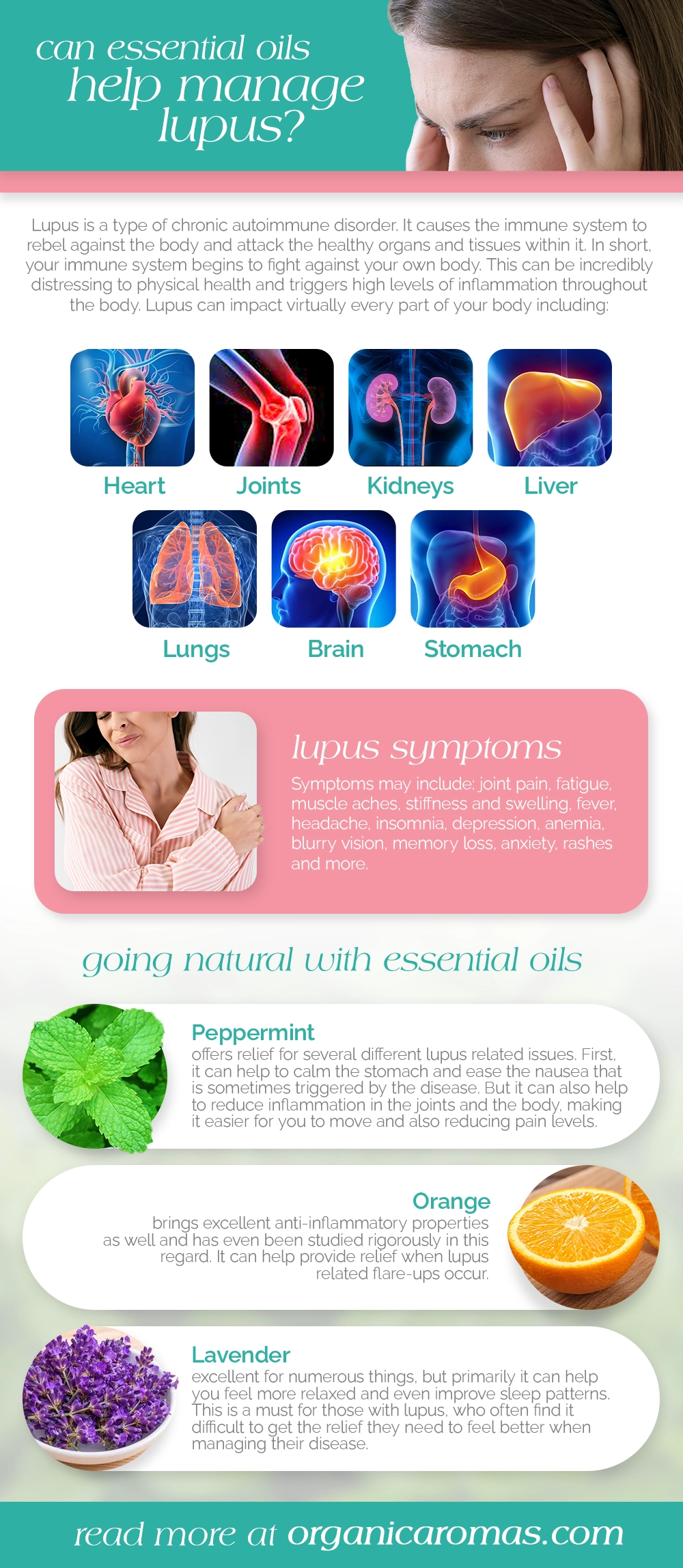
10 Reasons to Use Essential Oils for Lupus
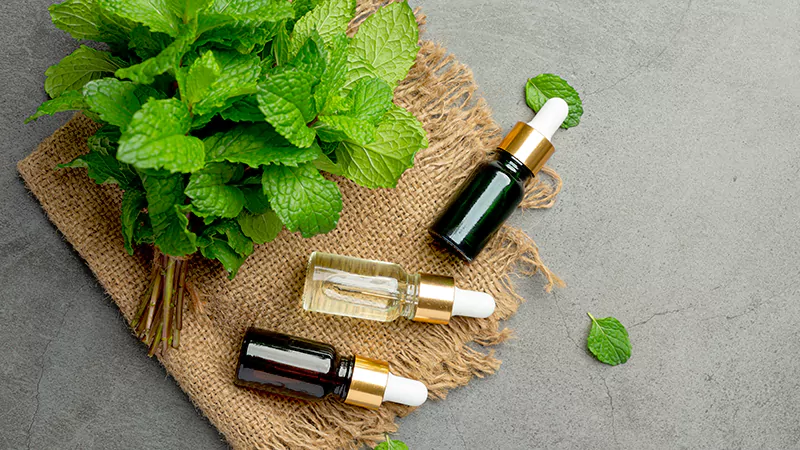
Using essential oils for lupus can provide numerous benefits and help manage the symptoms of this chronic disease. Here are the top 10 reasons to consider using essential oils for lupus:
- Reduce inflammation: Essential oils like frankincense, helichrysum, ginger, myrrh, thyme, and eucalyptus possess anti-inflammatory elements that can help alleviate inflammation associated with lupus.
- Calm skin rashes and itchiness: Eucalyptus, copaiba, and helichrysum essential oils are known to soothe skin rashes and relieve itchiness caused by lupus.
- Relieve pain: Essential oils such as lavender, peppermint, clary sage, and helichrysum can help alleviate pain associated with lupus.
- Support the immune system: Certain essential oils, like frankincense and sandalwood, have immune-modulating properties that can help regulate immune reactions in individuals with lupus.
- Promote relaxation and reduce stress: Lavender, sandalwood, and chamomile essential oils are known for their relaxing properties, which can help reduce stress and promote a sense of calmness.
- Improve sleep quality: Essential oils like lavender and chamomile can be used in aromatherapy to promote better sleep and alleviate sleep disturbances often experienced by individuals with lupus.
- Boost mood and mental well-being: Citrus essential oils, such as orange and lemon, have uplifting properties that can help improve mood and support mental well-being in those with lupus.
- Enhance digestion: Ginger and peppermint essential oils are commonly used to support healthy digestion and alleviate digestive issues that may arise in individuals with lupus.
- Provide antioxidant protection: Some essential oils, including frankincense and myrrh, have antioxidant properties that can help protect cells from oxidative stress and damage.
- Complement conventional treatments: Essential oils should not replace medical treatments for lupus, but they can be used as a complementary therapy to help manage symptoms and improve overall well-being.
How to Use Essential Oils
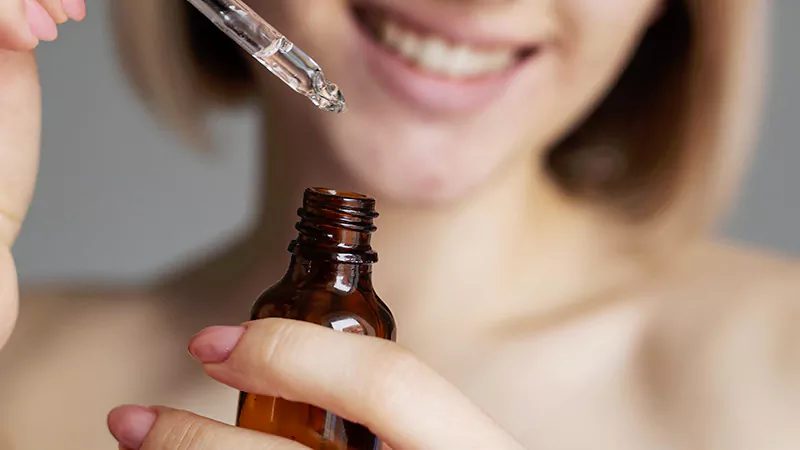
In order to use essential oils, you’ll have two primary options. Using them in an essential oil diffuser is the first and most common. Just add a few drops to a diffuser and allow the aroma to fill the room. The aromatherapy can help to relax you and bring about other therapeutic changes.
Another option is to apply essential oils topically. Mix the essential oil with a carrier oil like almond or coconut oil in a 3% diluted solution and massage into the skin on the affected areas. This can help reduce swelling directly, minimize pain, and bring additional relief when needed.
The bottom line is that yes, essential oils can help manage lupus and lupus related symptoms. They’re not a cure, but can certainly help ease the pain, swelling, and other problems that this disease can bring. As such, they’re well worth a try for those dealing with lupus.
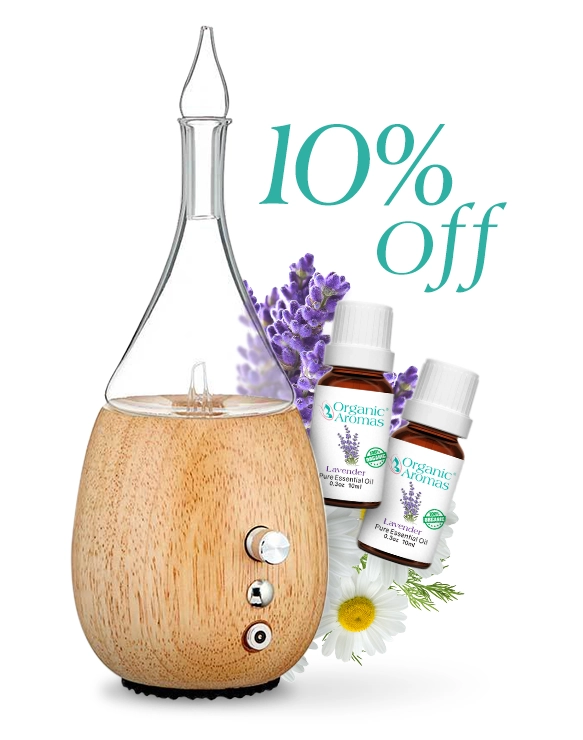
Give Me a 10% Discount!
[wpforms id=”57381″ title=”false”]
Conclusion
Lupus essential oils can serve as a valuable complementary treatment for individuals with lupus to aid stress relief. Aromatherapy essential oils may not replace conventional medication prescribed, their unique properties can offer additional support in managing symptoms and improving overall well-being.
The use of essential oils in conjunction with medical treatments can provide several benefits for individuals with lupus. These oils have the potential to reduce inflammation, alleviate pain, calm skin rashes, promote relaxation, boost mood, enhance digestion, and provide antioxidant protection. Incorporating essential oils into a holistic approach to lupus management may help individuals experience improved symptom control and a better quality of life.
However, it is crucial to exercise caution and observe certain precautions when using essential oils for lupus:
- Consult with a healthcare professional: Before using essential oils, it is important to consult with a healthcare professional who is knowledgeable about both lupus and essential oil safety. They can provide personalized guidance based on individual health conditions and medications.
- Perform a patch test: Some individuals with lupus may have heightened sensitivity or allergies to certain essential oils. Conduct a patch test by applying a small amount of diluted oil to a small area of skin and observe for any adverse reactions before using it more extensively.
- Dilute properly: Essential oils are highly concentrated and should always be diluted before use to avoid skin irritation or sensitization. Follow proper dilution guidelines and use carrier oils, such as coconut oil or jojoba oil, when applying essential oils topically.
- Avoid direct sunlight: Some essential oils, particularly citrus oils, can increase photosensitivity and make the skin more prone to sunburn. Avoid direct sunlight or use sunscreen if applying photosensitizing oils to the skin.
- Be mindful of interactions: Certain essential oils can interact with medications, including immunosuppressants and blood thinners. Always inform your healthcare provider about any essential oils you are using to ensure compatibility with your medications.
- Quality matters: Choose high-quality, pure essential oils from reputable sources to ensure their safety and efficacy. Look for oils that undergo third-party testing and are labeled as 100% pure or therapeutic grade.
In summary, all these essential oils can be a positive addition to a comprehensive lupus management plan, providing potential benefits for symptom relief and well-being. However, it is crucial to exercise caution, consult with healthcare professionals, follow proper dilution guidelines, and be aware of any potential interactions or sensitivities. By approaching the use of essential oils with care, individuals with lupus can harness their potential benefits while prioritizing their overall health and safety.




I have 2 sisters who are mirror twins, I was told by a bestie who died on Valentine’s Day 2017. She also was diagnosed with Sjogrens fibromyalgia. She told me she suspected I had fibromyalgia , as well as heritary pancreatitis & pancreatic divisum & nonalcoholic fatty infiltration of the liver. Now I save cirrhosis.
I discovered that Copaiba essential oils trigger the CBD 2 receptor sites in the body & brain.
I tried to see which other herbs or oils do. So far ones with lemon & lime work.
I have recently been diagnosed having lupus. I have abrasions/rashes all overy body. I’ve been using bio oil, vitamin E, other skin calming creams and it seems it’s not helping. My skin feels itchy all the time, at times feels like it’s burning. Could someone please give me advice on what to eat, oils to use, creams to put on my body. It’s depressing. I don’t even like going outside because of my insecurities of this horrible rash all over my body. Please help❤️
I have Lupus and Sjorgens diease along with DVT and thyroid diease. I am new to aromatherapy but I believe this can help as I am not a person who believes a pill can help. you take one you will have to take more as there is no reach on long term effects on pills. I’m a believer in natural healings
I do believe in the power of essential oils to help facilitate healing and ease symptoms. It helps with Lyme disease and lupus has some of the same symptoms. Great article, thanks!
I honestly never knew any of this was possible regarding essential oils. Wow!
Essential Oils have a multitude of uses, especially in health and wellness. I highly recommend reading The Practice Of Aromatherapy by Jean Valnet. It details cases of patients cured using aromatic essences, notes the properties of different essential oils, and gives various conditions and the essential oils needed to correct them.
Very interesting and informative article. I am discovering so much about aromatherapy, thanks.
Thanks for sharing. I need to share this with my cousin.
Thank you so much for sharing this EO information. Over the years I’ve had friends who were diagnosed with lupus. I’m a big fan and user of essential oils in many applications but this is the first time I’ve heard of its use in lupus treatment.
Never would have thought of this application for EOs.
Essentials oils are mind blowing the more I read about them the more I want to be involved with them. Thanks for great information
Thanks! Very informative info.
Woah, didn’t know!
This is very interesting. EOs are so wonderful for everything.
Thanks for a great informative article about Lupus, much to learn. Drs have tested me several times and it’s not clear yet, blood work is up and down. I think having a wonderful nebulizer & oils could help support the bodies function & structure to help manage systems.
It’s truly amazing the healing power of essential oils!!
Lupus is such a horrible disease. Thanks for the informative article.
I wish me, and my mother had known this, she passed away from Lupus in 2010.
Great article. I’m planning to use the healing qualities of essential oils as well with this diffuser.
I think natural healing can do more than we ever realized. Essential oils is definitely a way for these people to try to find some relief!
I didn’t know that, thank you!
Great information! Essential Oils are so beneficial for many things. Diffusing and topical applications help in so many ways. Thank you for sharing this information with us. Can’t wait to try your Nebulizing Diffuser and Essential Oils. I’ve heard great reviews about them.
Great article, didn’t know all of this. You learn something new every day with Organic Aroma
Very interesting article, lots of good info
Thank you!
This is very interesting and informative. I have 3 family members with lupus, and a cousin who passed away from complications of lupus a couple of years ago. I have purchased the lavender peppermint and orange essential oils and hope to share this info with my family. Thanks again for great information.
Thank you for another informative article that provides non-medical relief for those who suffer.
I have a few friends with Lupus. I will pass this article along to them.
Reducing stress is vital when you have Lupus. Diffusing essential oils really help do that!!